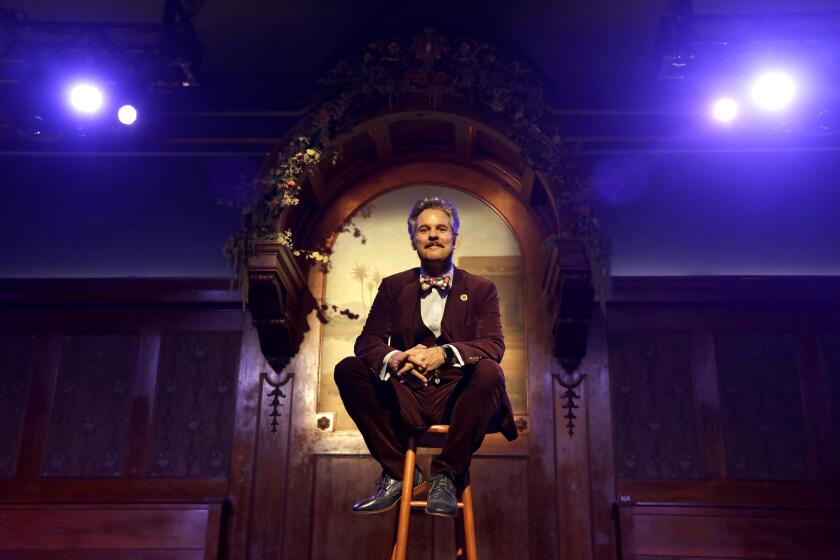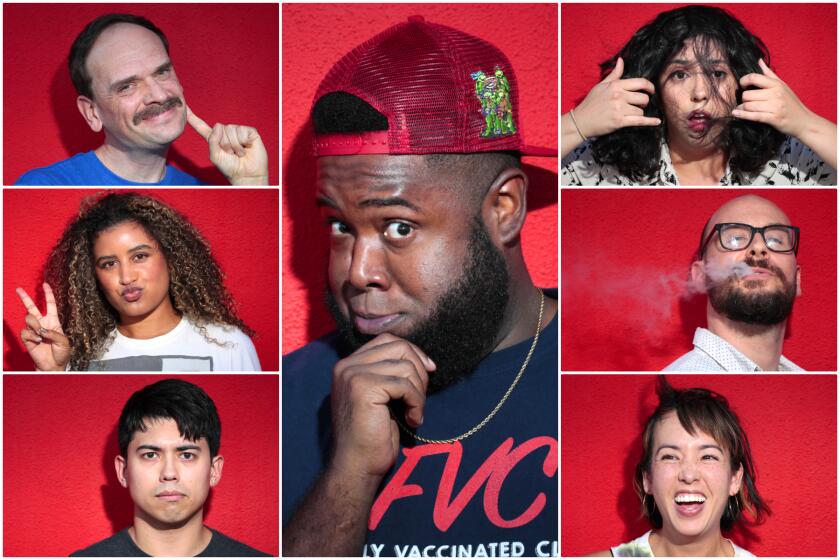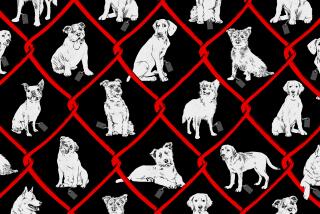Why Ildiko Tabori’s dog walking therapy is a comic’s best friend
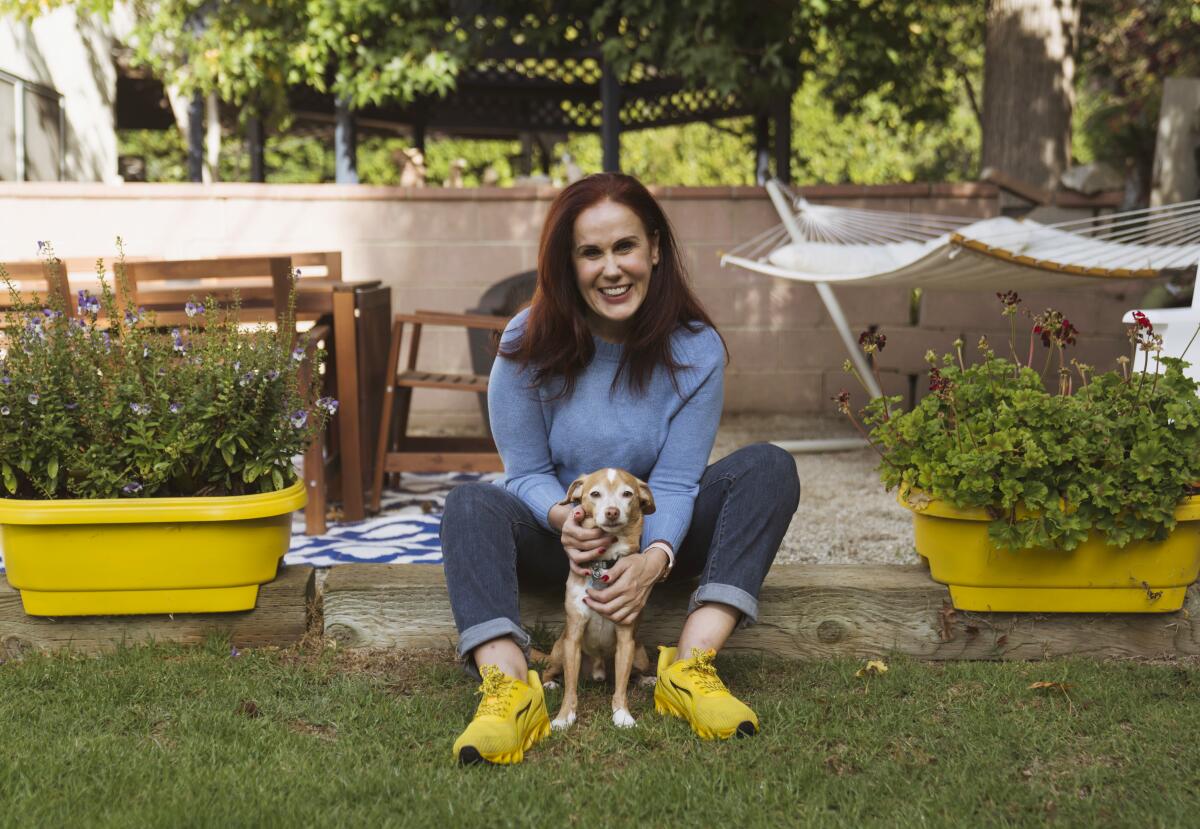
- Share via
A therapist, a comic and a dog are walking down the street. There’s no punchline here — it’s dog walking therapy.
Somewhere on a hilly neighborhood street in Culver City, clinical psychologist Ildiko Tabori is out walking her certified therapy dog, Chihuahua-poodle mix Johnny Carson, with a friend — or at least that is what it seems like from the outside looking in. Behind their pandemic masks, Tabori is talking with a patient, quite possibly a comedian, about the state of their life.
“I can always tell how someone is feeling by how they hold the leash and engage with the dog,” Tabori said. “When a patient is in a good place, they talk to the dog a lot during the walk. When they’re in a negative mood, they’re initially less patient with him.”
Since being hired by the Laugh Factory on Sunset Boulevard in 2011 as the comedy club’s in-house therapist, her client list caters almost exclusively to the Los Angeles stars and up-and-comers in the L.A. comedy scene. For years, comedy clients have sat down with her on the third-floor office of the Laugh Factory on an old-fashioned red couch that once belonged to Groucho Marx. In recent years, she’s shifted to doing sessions on the couch at her Culver City home.
Despite never getting on stage to tell a joke, Tabori’s therapy sessions have become a thoroughly tapped resource in the comedy community.
“Comics don’t have health insurance and Dr. Tabori goes out of her way to provide a much-needed service for a group of people who clearly need therapy,” comedian Grant Cotter says. “As a comic, I thought if I talked about my problems on stage, everything would be fine. Sometimes you just need a different outlet. I’m grateful for the Laugh Factory and [owner] Jamie Masada for linking me up with her.”
Actor, writer, and comedian Suli McCullough started seeing Tabori when he was going through a toxic time in his life, questioning himself about even staying in the business. “There were a lot of red flags that she helped me to see and change. I wasn’t in a positive place at all, and she was necessary in helping me work though some of my stuff. In fact, I should probably go back to therapy because I feel like I might have over-isolated during the pandemic,” McCullough admits.
Finding new ways to accommodate needs during (and beyond) the pandemic became a must for Tabori’s business. Enter: rescue-pet-turned-therapy-super-dog, Johnny Carson.
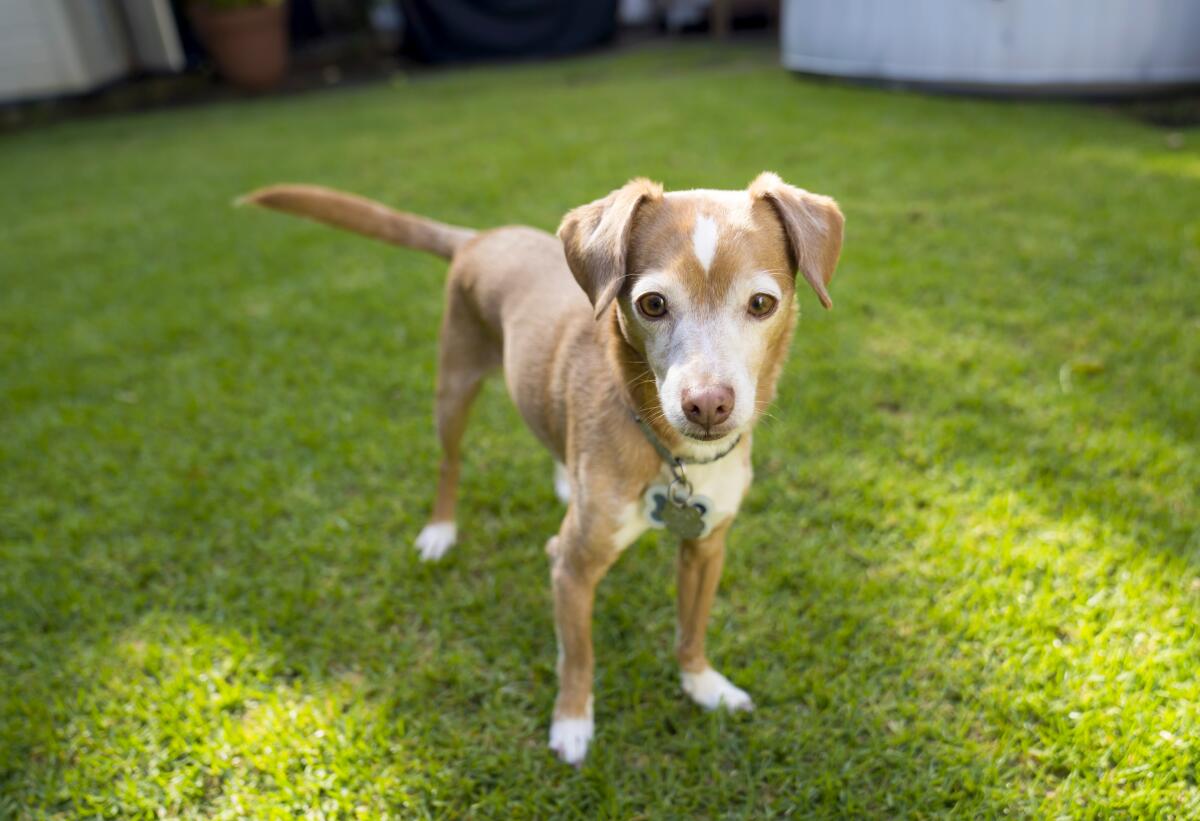
In 2015, while looking for a larger breed dog, Tabori’s daughter spied a 1-year-old puppy at Adopt and Shop Rescue in Culver City. It didn’t require too much begging and pleading to make the switch from wanting a big dog to a small dog because, as the story goes, it was love at first sight.
When the pandemic hit, Johnny Carson became Tabori’s therapy dog right away.
“Some of my patients still wanted in-person sessions early in the pandemic, but I was concerned because I was only working in my home office and wasn’t sure if I wanted people in my home so early on,” Tabori said. “So, I started dog walk therapy — my patients hold the leash, I pick up the poo, and we walk around my hilly neighborhood talking.”
The dog’s presence around her patients and his love for being petted decreased anxiety and improved their moods during the session. The feeling was apparently mutual.
“Johnny Carson has learned the sound of my patients’ cars before they’ve even parked. He gets very excited and hovers at the door with his super high-pitched squeak that doesn’t relent until I open it and let him run to greet the patient by running circles around them, literally. He’s also incredibly agile and tends to get himself in these odd contortions. I have a patient that refers to him as, Cirque du Chien [Circus of the Dog],” Tabori said.
Four-legged friends have been used to aid in mental health care for years because the act of petting can decrease anxiety and stress, it’s a natural mood-elevator, and they give you something to care for.
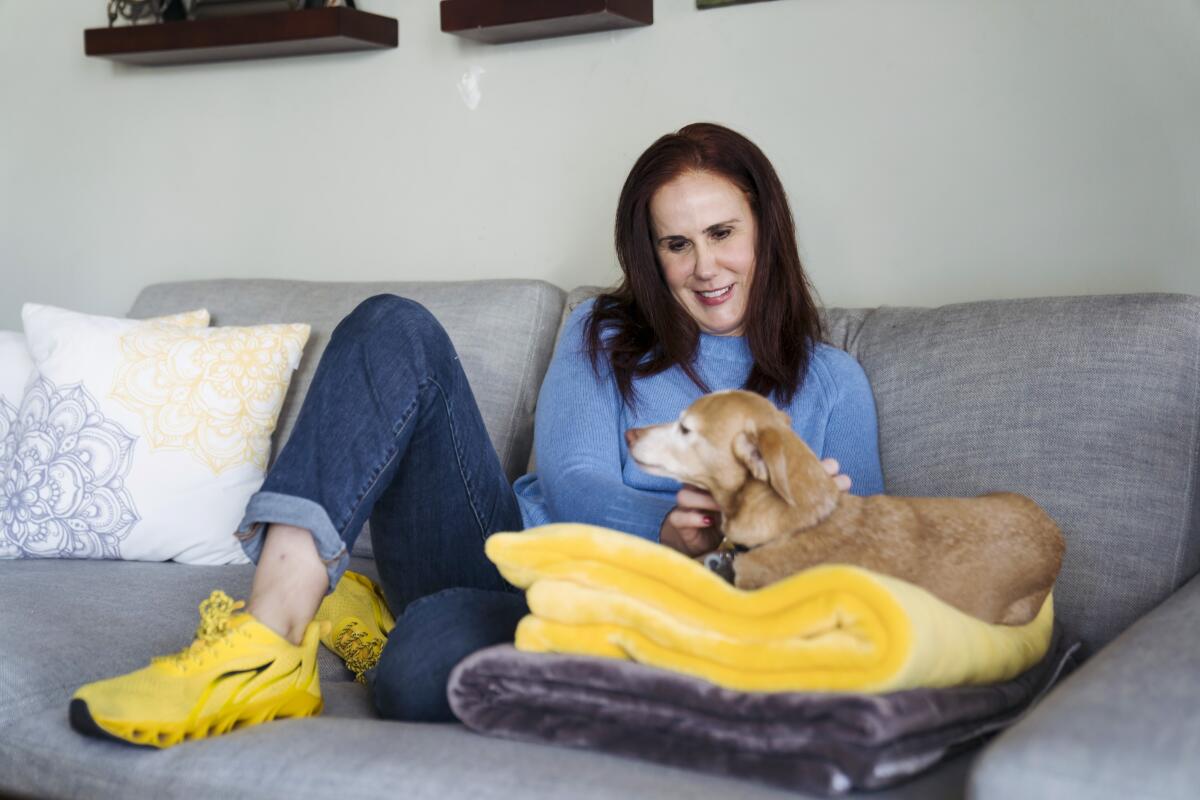
“Dog therapy allows for a more relaxed environment to explore and process feelings that sometimes feel scary within the confines of a therapy room,” Tabori explains. “Johnny Carson is like the dog version of that person who makes you feel like you’re the only person around. He’s always there somewhere during a session as the cutest piece of equipment.”
Dr. Steve, host of “Weird Medicine” on SiriusXM, confirmed that there’s something about the unconditional nature of dogs’ love and attention that makes them ideal therapy animals. “When we’re upset, our dogs come to us. They don’t judge us, at least not in any way that we can determine, and they don’t try to fix anything. They just offer themselves as comfort,” he said.
During the pandemic, the use of therapy dogs in hospitals decreased considerably due to fewer visitors and extra focus on sanitizing hospital rooms. Meanwhile, while trotting in the fresh air in Tabori’s Los Angeles neighborhood, Johnny Carson soldiers up hills while lifting spirits — and taking frequent breaks to lift his leg.
“People open up a lot when we’re walking the dog and it really does shift one’s focus immediately,” Tabori said. “Also, during their time, Johnny Carson takes forever to relieve himself because he must find the exact right blade of grass to go on. So, as comedians do, it’s now being referred to as Johnny Carson reading his ‘pee-mail’ and sliding into someone’s ‘pee-m’s,’” the therapist said with a laugh. “Of course, when he pees on a wall, it is now a ‘Pee-casso.’”
Now imagine if you could take your own pooch with you to therapy — oh, wait — you can. The more the merrier as Tabori also does a collective dog walk therapy. As long as your dog gets along with others, they’re welcome to join. “I have a couple I see individually that bring their dogs. These three Chihuahua mixes just walk in a little pack.
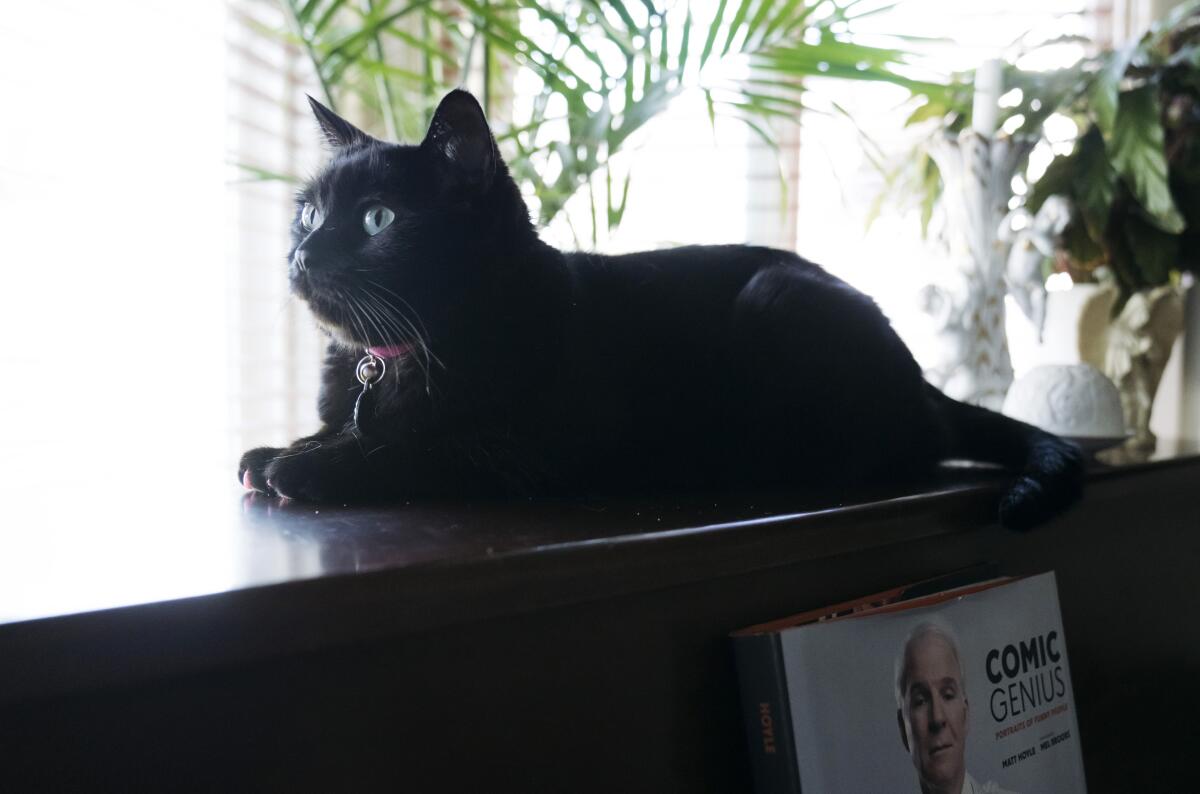
Of course, with comedians as patients, there are laughs to be had underneath the weight of the problems they need to get off their shoulders. Tabori admits, “All of the comedians who do impressions give the dog the “Johnny Carson voice.” Strangely, however, her cat, Eartha Kitty does not have the soulful impression of the amazing Eartha Kitt. It ends up being more like Samuel L. Jackson. There is no cat walking therapy, but Eartha Kitty does periodically present herself during a traditional therapy session. “Along with the dog and my patient, it becomes group therapy.”
Tabori says she can see the progress her patients had made in the session when they start engaging more with the dog toward the end of the walk.
Physically walking a therapy dog aside, Dr. Steve adds, “I’ve seen patients who have severe dementia and are basically unresponsive, or even those who are agitated and unresponsive, respond positively to therapy dogs in a nursing facility. Petting a dog seems to be hardwired into our psyche, at least in areas where dogs as pets are common.”
Adding dog walk therapy to her “menu” has been a hit with her comedy patients, Tabori says. If you’re a dog lover, how could it not be? “Now I leave it all up to the client. Do you want to talk online? Do you want to come in and sit? Do you want to walk the dog? The only thing that changes is where I’m sitting, because the dog is happy anywhere.”
More to Read
The biggest entertainment stories
Get our big stories about Hollywood, film, television, music, arts, culture and more right in your inbox as soon as they publish.
You may occasionally receive promotional content from the Los Angeles Times.
